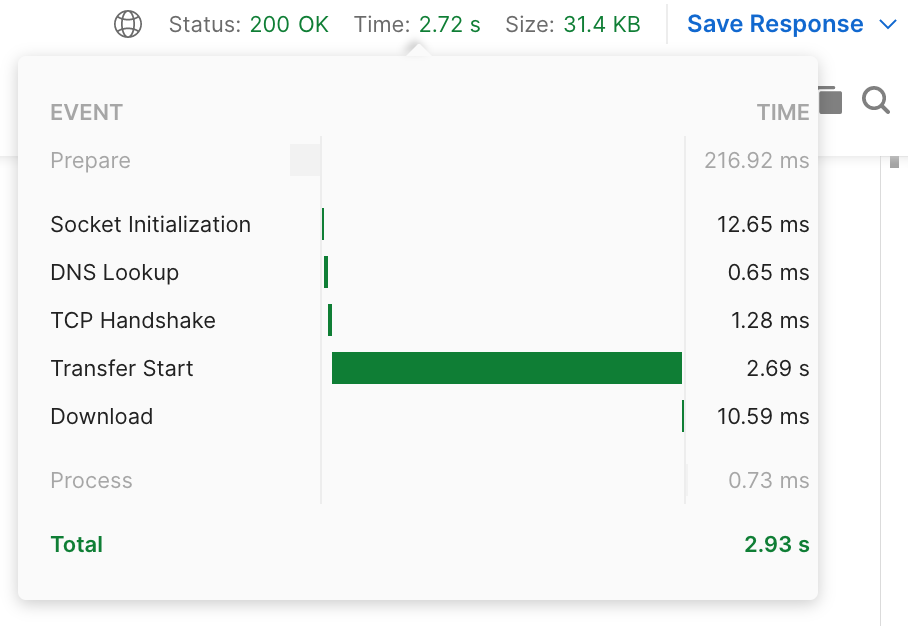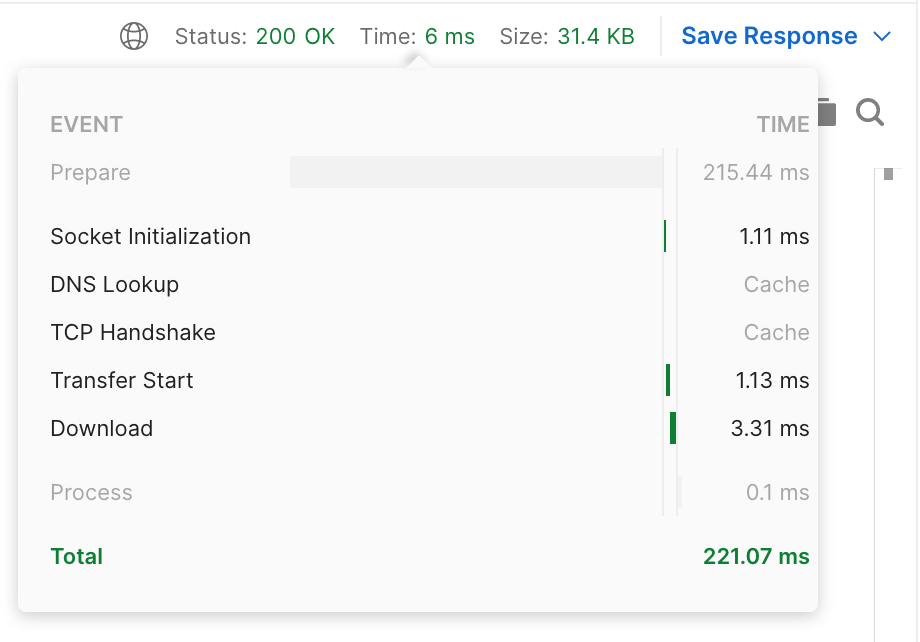4 minutes
Caching API response in Go
Github link - https://github.com/bsidio/traderbase_go
TL;DR - Reduced Response time from seconds to milliseconds using In memory Cache
Disclaimer - This ain’t a deep technical post. I am in the process of learning Go. My method to learn anything is learn while building. So there might be more optimal solutions out there. But this one fits my use case.
When building any applications, I always build from the end user point of view. What if I am the user of my website and What are my expectations when using the site. The performance and UI are the two important factors for me. No matter how performative the backend is if UI is clunky I will not use it. One may have a great UI but if it takes forever to load can affect user retentions. While building any product we have to make sure both frontend and backend are as optimal as possible.
When building tr.bsid.io (A Financial analysis platform). We do complex queries to retrieve data from multiple tables sometimes with join queries and fetch hell lot of data. I am in the process of rewriting the backend in Go which is currently in NodeJs. With the new code I had the opportunity to implement caching of API Respone.
Ok enough talk, Show me the code!
package http
import (
"fmt"
"net/http"
"net/http/httptest"
"time"
"github.com/bsidio/traderbase_go/internal/transport/cache/memory"
)
type Storage interface {
Get(key string) []byte
Set(key string, content []byte, duration time.Duration)
}
var storage Storage
func init() {
storage = memory.NewStorage()
}
func (h *Handler) cached(handler http.HandlerFunc) http.HandlerFunc {
return http.HandlerFunc(func(w http.ResponseWriter, r *http.Request) {
duration := "24h"
content := storage.Get(r.RequestURI)
if content != nil {
w.Header().Add("Content-Type", "application/json")
w.Write(content)
} else {
c := httptest.NewRecorder()
handler(c, r)
for k, v := range c.HeaderMap {
w.Header()[k] = v
}
w.WriteHeader(c.Code)
content := c.Body.Bytes()
if d, err := time.ParseDuration(duration); err == nil {
storage.Set(r.RequestURI, content, d)
} else {
fmt.Printf("Page not cached. err: %s\n", err)
}
w.Write(content)
}
})
}
cache.go ->
package memory
import (
"sync"
"time"
)
// Item is a cached reference
type Item struct {
Content []byte
Expiration int64
}
// Expired returns true if the item has expired.
func (item Item) Expired() bool {
if item.Expiration == 0 {
return false
}
return time.Now().UnixNano() > item.Expiration
}
//Storage mecanism for caching strings in memory
type Storage struct {
items map[string]Item
mu *sync.RWMutex
}
//NewStorage creates a new in memory storage
func NewStorage() *Storage {
return &Storage{
items: make(map[string]Item),
mu: &sync.RWMutex{},
}
}
//Get a cached content by key
func (s Storage) Get(key string) []byte {
s.mu.RLock()
defer s.mu.RUnlock()
item := s.items[key]
if item.Expired() {
delete(s.items, key)
return nil
}
return item.Content
}
//Set a cached content by key
func (s Storage) Set(key string, content []byte, duration time.Duration) {
//fmt.Println(content)
s.mu.Lock()
defer s.mu.Unlock()
s.items[key] = Item{
Content: content,
Expiration: time.Now().Add(duration).UnixNano(),
}
// fmt.Println(s.items[key])
}
handler.go -> Cached is an http middleware that runs before the http handler and returns the content straight away if the page is already cached. If it’s not, the handler is executed and its body is cached for a given period of time. Because it’s a middleware, it’s really easy to enable and disable it for certain routes. Keep reading for a concrete example.
package http
import (
"encoding/json"
"fmt"
"net/http"
"github.com/bsidio/traderbase_go/internal/data"
"github.com/gorilla/mux"
)
//Handler - stores pointer to service
type Handler struct {
Router *mux.Router
Service *data.Service
}
//ad object to store response
type Response struct {
Message string
Error string
}
//Returns pointer to Handler Struct
func NewHandler(service *data.Service) *Handler {
return &Handler{
Service: service,
}
}
//setup all routers to our application
func (h *Handler) SetupRoutes() {
fmt.Println("Setting up routes")
h.Router = mux.NewRouter()
h.Router.HandleFunc("/api/health", func(w http.ResponseWriter, r *http.Request) {
//w.Header().Set("Contect-Type", "application/json; charset=UTF-8")
w.Header().Add("Content-Type", "application/json")
w.WriteHeader(http.StatusOK)
if err := json.NewEncoder(w).Encode(Response{Message: "I am Alive"}); err != nil {
panic(err)
}
})
h.Router.HandleFunc("/api/earnings/amc/{ticker}", h.cached(h.GetAmcEarningsData)).Methods("GET")
h.Router.HandleFunc("/api/earnings/bmo/{ticker}", h.cached(h.GetBmoEarningsData)).Methods("GET")
h.Router.HandleFunc("/api/uploaded/{ticker}", h.cached(h.GetUploadedData)).Methods("GET")
h.Router.HandleFunc("/api/uploaded/options/{ticker}", h.cached(h.GetUploadedOptionsData)).Methods("GET")
h.Router.HandleFunc("/api/uploaded/sector/{ticker}", h.cached(h.GetUploadedSectorData)).Methods("GET")
h.Router.HandleFunc("/api/uploaded/industry/{ticker}", h.cached(h.GetUploadedIndData)).Methods("GET")
h.Router.HandleFunc("/api/uploaded/subindustry/{ticker}", h.cached(h.GetUploadedSubIndData)).Methods("GET")
h.Router.HandleFunc("/api/insider/{ticker}", h.cached(h.GetInsiderData)).Methods("GET")
h.Router.HandleFunc("/api/iex/stats/{ticker}", h.cached(h.GetIexStatsData)).Methods("GET")
h.Router.HandleFunc("/api/iex/previous/{ticker}", h.cached(h.GetIexPrevData)).Methods("GET")
h.Router.HandleFunc("/api/iex/history/{time}/{ticker}", h.cached(h.GetIexchartData)).Methods("GET")
h.Router.HandleFunc("/api/iex/history/chart/{time}/{ticker}", h.cached(h.GetIexchartDataOnly)).Methods("GET")
h.Router.HandleFunc("/api/coverage/{ticker}", h.cached(h.GetCoverageData)).Methods("GET")
h.Router.HandleFunc("/api/stocks/list/{type}/{week}", h.cached(h.GetStockListData)).Methods("GET")
}
func (h *Handler) sendErrorResponse(w http.ResponseWriter, message string, err error) {
w.WriteHeader(http.StatusInternalServerError)
if err := json.NewEncoder(w).Encode(Response{Message: message, Error: err.Error()}); err != nil {
panic(err)
}
}
Results -
Before ->

